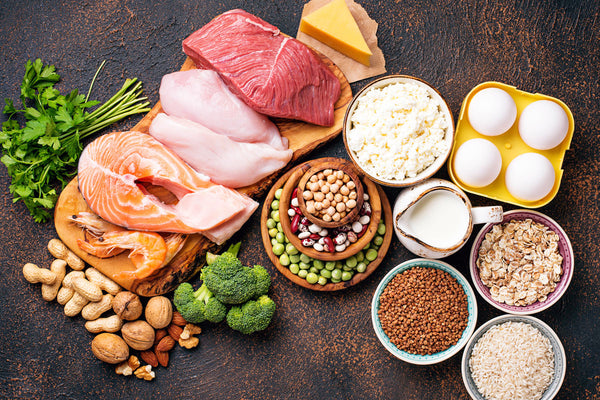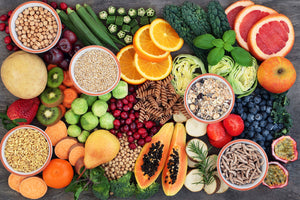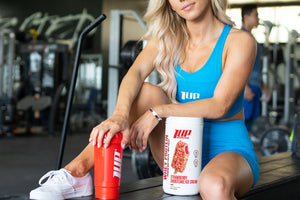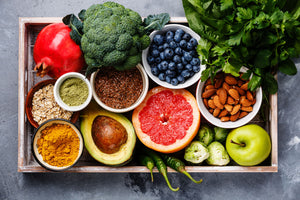Protein is the darling of the nutrition realm. It hasn’t been as polarizing as carbohydrates or fat have been over the past few decades, but there was a time when it was thought that consuming too much protein was harmful to your health, particularly the kidneys and cardiovascular system. Thankfully, researchers have extensively debunked those myths.[1,2,3,4,5]
Protein is vital, and not getting adequate protein each day is considered a nutritional deficiency. Our bodies need protein to build and repair muscle, nourish healthy hair, skin & nails, make hormones, support immune function, and regulate metabolism.
That being said, not all protein sources are the same…
Animal Protein vs Plant Protein
The plant-based eating movement has surged in popularity in recent years. While we’ve known that eating fruits, vegetables, and whole grains is beneficial, there has been a large emphasis on the benefits of plant protein.
However, there are several things to consider when deciding on the best protein sources for your diet. From a muscle building and recovery standpoint, you want to focus on consuming a variety of high quality proteins that are efficiently digested and absorbed by the body as well as contain all the essential amino acids (EAAs) the body needs to effectively synthesize the hundreds of different proteins your body needs.
To help individuals discern the quality of a particular protein source, researchers and food scientists have developed a scoring system, known as the protein digestibility corrected amino acid score (PDCAAS). It assesses the digestibility and amino acid score of a protein sample. In other words, the higher the PDCAAS the more efficiently our bodies will be able to use a given protein.
Generally speaking, animal proteins score higher than plant protein due to a variety of factors including essential amino acid content and a lack of “anti-nutrients” that reduce the body’s ability to digest/absorb the protein.
The way around some of these limitations is to combine multiple plant proteins and/or consume larger quantities of plant-based proteins per meal to overcome their lower anabolic capacity. Following is a sample table of PDCAAS for various animal and plant proteins[6,7,8]:
|
Protein Source |
PDCAAS |
|
Egg Protein |
1.0 |
|
Whey Protein |
1.0 |
|
Casein Protein |
1.0 |
|
Milk Protein |
1.0 |
|
Salmon |
1.0 |
|
Soy Protein |
1.0 |
|
Beef |
0.92 |
|
Pea Protein |
0.83 |
|
Black Beans |
0.53 |
|
Chickpeas |
0.66 |
|
Green Lentils |
0.63 |
As you can see, in isolation, animal proteins by and large are superior to plant proteins in terms of digestibility and amino acid content. Does this mean that you should avoid plant protein or that it can limit your results?
Absolutely not!
However, you will need to consume a higher amount of plant protein compared to animal sources to make up for its limitations or combine multiple plant protein sources due to their complementary amino acid profiles, if you’re serious about maximizing your potential to build strength in the gym.
With that being said, here are the top 10 dietitian-approved protein sources to include in your nutrition plan to lose fat, build muscle, and get results this year!
#1 Wild Salmon
All things considered, Wild Alaskan salmon is about as perfect a protein as you can get. It has high bioavailability, a complete amino acid profile and heart-healthy, anti-inflammatory https://1upnutrition.com/blogs/expert-advice/what-are-omega-3s-and-why-they-are-important.
Plus, salmon also contains beneficial antioxidants called astaxanthin, a red pigment that gives salmon its natural color.
While farm-raised Atlantic salmon is a complete source of bioavailable protein, it is generally viewed as less nutritious due to lower omega-3 content and a processed, high fat, high protein diet.[9] Additionally, wild Alaskan salmon also contain higher levels of essential minerals, including zinc, potassium, and iron compared to farmed varieties).
Now, many individuals don’t regularly consume enough fatty fish (or seafood, in general) for a variety of reasons, including not liking the taste/texture and cost compared to other protein sources. Omega-3 fatty acids are still important, nevertheless, which is why we offer a high-quality, high-potency omega-3 fish oil product to help you get the benefits of omega-3s, even if you’re not eating seafood regularly.
#2 Eggs
Eggs are the perfect portable protein, especially if you have hard-boiled eggs in the fridge. They contain highly bioavailable protein, healthy fats, vitamins, minerals, and other important phytonutrients, such as choline, which the body requires to liver health, brain development, and cognitive function.[10]
One of the body’s most important neurotransmitters, acetylcholine (aka the “learning” neurotransmitter) requires choline. In addition to learning, acetylcholine also impacts memory, muscle contractions, and the mind-muscle connection, which is why you commonly see ingredients that support acetylcholine levels, such as DMAE and huperzine, in 1UP Pre Workout and Stim-Free Pre Workout.
#3 Greek Yogurt
As you saw in the table above, there were a number of dairy products included, and for good reason -- milk proteins (casein and whey) are amazing sources of complete, highly bioavailable protein.
Greek Yogurt, compared to regular yogurt, has higher protein and less carbohydrates. You also get a nice serving of natural probiotics to support gut health. As far as serving options, Greek yogurt is delicious on its own and you can also use it as the base of a parfait (hint: add a scoop of protein powder to really amp up the protein content of your meal) with fruit and walnuts (a plant source of omega-3 fatty acids). Greek yogurt can also be used as a substitute for mayo as well as a partial replacement for some of the oil/butter in baked goods.
#4 Grass-Fed Beef
Red meat consumption has been a polarizing issue for a long time. It was considered inflammatory and a key contributor to cardiovascular disease. Recent research, though, is disputing these long held beliefs and showing that a diet is a combination of multiple factors, not just a single food or group of foods.[11]
Nevertheless, the vast majority of researchers advocate limited red meat intake, choosing leaner cuts of red meat and replacing some of an individual’s red meat intake with eggs, low-fat dairy, and/or plant protein sources.
Grass-fed beef is naturally lower in fats than conventional beef offerings (on average) and have higher concentrations of omega-3’s, vitamin A and vitamin E (an important antioxidant).
#5 Bison
Building on the previous protein source, bison is an excellent high-quality protein that is naturally leaner than beef (less total calories and fat) as well as higher in protein. Moreover, bison tends to have higher levels of B vitamins (essential micronutrients that support energy production, memory and mood) as well as zinc, copper, and potassium. To cap it off, bison was found in a 2013 study to pose less cardiovascular health concerns than beef.[12]
#6 Cottage Cheese
Cottage cheese is a delicious, yet often overlooked, protein source that’s rich in casein -- the slower-digesting, yet equally effective, counterpart to fast-digesting whey. A single cup packs over 20 grams of protein while being lower in carbohydrates (sugar) compared to regular (not Greek) yogurt.
Cottage cheese has long been a popular pre-bed snack for bodybuilders and physique athletes, but it can also work as a between meal snack or breakfast, topped with fruit. Believe it or not, it actually works pretty well as a dip. Just blend up some cottage cheese with an immersion blender (or food processor), add in your favorite seasonings, and voila! You have a healthy, high-protein dip for veggies, fruit, or crackers.
#7 Soy
Soy is one of the few plants that offers a complete protein source, meaning it also contains all nine essential amino acids our bodies require to stimulate and sustain protein synthesis. Soy can be found in many forms in grocery stores -- tofu, edamame, meat substitutes, and protein powders/bars.
Research indicates that consuming soy protein may benefit cardiovascular health by reducing LDL (“bad”) cholesterol. This is likely due to soy not containing the same amount of saturated fat as other fatty meat-based protein sources.[13]
As for concerns about soy consumption disrupting hormone health, particularly for men due to the presence of phytoestrogens, research has shown that there’s really no need for concern. a A meta-analysis of 15 placebo-controlled studies concluded that soy protein have no significant impact on testosterone, free testosterone or sex-hormone binding globulin (SHBG).[14]
#8 Chicken
Chicken has been a staple protein of athletes, both those competing on the field and on the stage, for decades. It’s a source of affordable, complete, and bioavailable protein that is also rich in B vitamins, including niacin and B6, which support cardiometabolic health and cognitive function.
The relatively neutral taste of chicken breast makes it extremely versatile and can fit into any number of dishes, including soups, stews, salads, or as the main feature. It also freezes well and reheats well, the same of which can’t be said for other protein sources (e.g. eggs, seafood, etc.).
While chicken breast is the default option for most of us, don’t ignore chicken thighs. They’re still high in protein and only have slightly more fat (which creates a richer flavor) than chicken breasts.
#9 Shrimp
Shrimp is extremely nutritious, while also being low in calories. In addition to containing lots of protein per serving with very little fat, these tasty crustaceans also contain important micronutrients and antioxidants, including iodine which is vital for thyroid function and hormone support.
Despite being a low-calorie protein source, shrimp are often feared/avoided for their cholesterol content. However, research has shown that these fears are largely overblown as dietary cholesterol (for most individuals) does not result in elevated serum cholesterol levels.[15] Both shrimp and eggs contain cholesterol, yet they are low in saturated fat and are considered two of the best protein sources for women and men.
#10 Protein Powder
Last, but certainly not least, we have protein powder. Whey protein has long been the “king” of protein supplements, but over the past few years, there’s been an explosion of plant protein blends (previously, the only two major options were soy protein and brown rice protein).
As we discussed above, plants are typically lacking in one or more essential amino acids (making them an “incomplete” protein) and/or have certain factors that limit their bioavailability. The solution to this is to properly prepare your plants (soaking, fermenting, etc.), pair them with a complementary plant food (for example beans + rice), and increase the total amount of plant foods consumed.
Plant-based protein powders avoid many of these issues by processing the plants and isolating the proteins, which reduces the “antinutrients”, as well as makes it easier to consume larger quantities without suffering GI distress.
Protein powders are well researched and have been shown to offer a number of benefits, including lean mass gains, weight loss, immune support, and cardiovascular health.[16,17,18]
Plus, protein powders are also extremely versatile while at the same time providing a cost-effective and easy-to-prepare option. In addition to the standard post-workout protein shake, protein powder can also be included in smoothies, oatmeal, pancake/muffin batters, and yogurt. 1UP offers a diverse array of best-selling protein powders for men and women, including 1UP Whey Protein, Isolate Protein, Clear Protein, and Vegan Protein, to name a few.
This can be used standalone and in combination with each other or other protein sources to help you meet your daily protein requirements and make sure you get all the benefits that consuming enough protein has to offer.
And, to make sure that you’re hitting your protein goals for the day, make sure to download the 1UP Fitness App, which helps you figure out how much protein you need per day to get results as well as easily track it!
References
- Antonio, J., Ellerbroek, A., Silver, T. et al. A high protein diet (3.4 g/kg/d) combined with a heavy resistance training program improves body composition in healthy trained men and women – a follow-up investigation. J Int Soc Sports Nutr 12, 39 (2015). https://doi.org/10.1186/s12970-015-0100-0
- Mantzouranis, E.; Kakargia, E.; Kakargias, F.; Lazaros, G.; Tsioufis, K. The Impact of High Protein Diets on Cardiovascular Outcomes: A Systematic Review and Meta-Analysis of Prospective Cohort Studies. Nutrients 2023, 15, 1372. https://doi.org/10.3390/nu15061372
- Antonio J, Peacock CA, Ellerbroek A, Fromhoff B, Silver T: The effects of consuming a high protein diet (4.4 g/kg/d) on body composition in resistance-trained individuals. J Int Soc Sports Nutr 2014, 11:19
- Jose Antonio, Anya Ellerbroek, Tobin Silver, et al., “A High Protein Diet Has No Harmful Effects: A One-Year Crossover Study in Resistance-Trained Males,” Journal of Nutrition and Metabolism, vol. 2016, Article ID 9104792, 5 pages, 2016. https://doi.org/10.1155/2016/9104792.
- Santesso N, Akl EA, Bianchi M, Mente A, Mustafa R, HeelsAnsdell D, et al. Effects of higher- versus lower-protein diets on health outcomes: a systematic review and meta-analysis. Eur J Clin Nutr. 2012;66:780–8. doi: 10.1038/ejcn.2012.37
- Hoffman JR, Falvo MJ. Protein - Which is Best? J Sports Sci Med. 2004 Sep 1;3(3):118-30. PMID: 24482589; PMCID: PMC3905294.
- PulseCanada. (2011). Protein Quality of Cooked Pulses (PDCAAS Method). Agriculture and Agri-Food Canada.http://www.pulsecanada.com/uploads/ff/28/ff280f2f10206d5a53a241ef6e2e2d25/USA_PC_protein_fact_sheet_p6.pdf
- Zhong, C.; Feng, Y.; Xu, Y. Production of Fish Analogues from Plant Proteins: Potential Strategies, Challenges, and Outlook. Foods 2023, 12, 614.https://doi.org/10.3390/foods12030614
- https://www.sciencedirect.com/science/article/pii/S0160412016300587
- Mehedint MG, Zeisel SH. Choline's role in maintaining liver function: new evidence for epigenetic mechanisms. Curr Opin Clin Nutr Metab Care. 2013 May;16(3):339-45. doi: 10.1097/MCO.0b013e3283600d46. PMID: 23493015; PMCID: PMC3729018.
- Campbell W.W. Animal-based and plant-based protein-rich foods and cardiovascular health: A complex conundrum. Am. J. Clin. Nutr. 2019;110:8–9. doi: 10.1093/ajcn/nqz074.
- McDaniel J, Askew W, Bennett D, Mihalopoulos J, Anantharaman S, Fjeldstad AS, Rule DC, Nanjee NM, Harris RA, Richardson RS. Bison meat has a lower atherogenic risk than beef in healthy men. Nutr Res. 2013 Apr;33(4):293-302. doi: 10.1016/j.nutres.2013.01.007. Epub 2013 Mar 6. PMID: 23602247; PMCID: PMC5858688.
- Wong, W. W., Smith, E. O., Stuff, J. E., Hachey, D. L., Heird, W. C., & Pownell, H. J. (1998). Cholesterol-lowering effect of soy protein in normocholesterolemic and hypercholesterolemic men1234. The American Journal of Clinical Nutrition, 68(6), 1385S-1389S. https://doi.org/https://doi.org/10.1093/ajcn/68.6.1385S
- Hamilton-Reeves JM, Vazquez G, Duval SJ, Phipps WR, Kurzer MS, Messina MJ. Clinical studies show no effects of soy protein or isoflavones on reproductive hormones in men: results of a meta-analysis. Fertil Steril. 2010 Aug;94(3):997-1007. doi: 10.1016/j.fertnstert.2009.04.038. Epub 2009 Jun 12. PMID: 19524224.
- Soliman GA. Dietary Cholesterol and the Lack of Evidence in Cardiovascular Disease. Nutrients. 2018 Jun 16;10(6):780. doi: 10.3390/nu10060780. PMID: 29914176; PMCID: PMC6024687.
- He, J., Wofford, M. R., Reynolds, K., Chen, J., Chen, C.-S., Myers, L., Minor, D. L., Elmer, P. J., Jones, D. W., & Whelton, P. K. (2011). Effect of Dietary Protein Supplementation on Blood Pressure. Circulation, 124(5), 589–595. https://doi.org/10.1161/CIRCULATIONAHA.110.009159
- Ha DJ, Kim J, Kim S, Go GW, Whang KY. Dietary Whey Protein Supplementation Increases Immunoglobulin G Production by Affecting Helper T Cell Populations after Antigen Exposure. Foods. 2021 Jan 19;10(1):194. doi: 10.3390/foods10010194. PMID: 33477967; PMCID: PMC7835905.
- Frestedt JL, Zenk JL, Kuskowski MA, Ward LS, Bastian ED. A whey-protein supplement increases fat loss and spares lean muscle in obese subjects: a randomized human clinical study. Nutr Metab (Lond). 2008 Mar 27;5:8. doi: 10.1186/1743-7075-5-8. PMID: 18371214; PMCID: PMC2289832.






